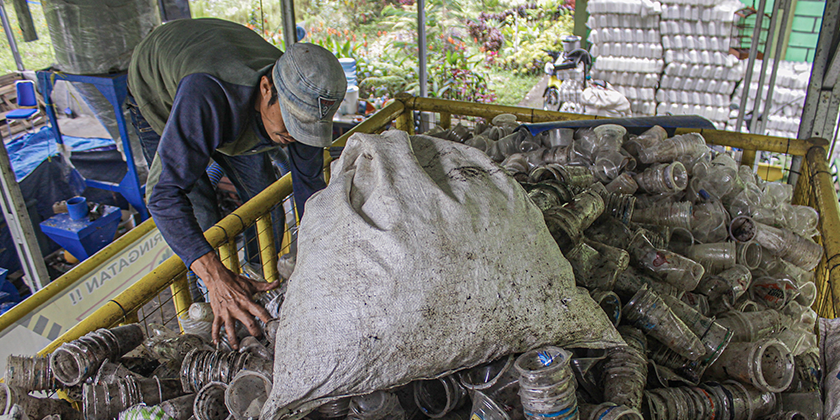Is Your Recycled Plastics Value Chain Truly Transparent?
-

-
Santwana Sneha
-
October 9, 2024
-
5 min read

Santwana Sneha
October 9, 2024
5 min read


In today’s world, where the push for sustainability is reshaping practices, effective waste management has become increasingly vital, particularly for plastics. Ensuring a responsible recycled plastics value chain goes beyond economic and environmental benefits, involving complex social and environmental challenges. It requires evaluating the conditions under which materials are collected, distributed, and processed to safeguard workers’ rights. This article explores the need for monitoring of human rights and social impacts within this sector.
Why are traceability and transparency becoming critical in the recycled plastics value chain?
Traceability is the ability to track the history, application, and location of an object, including the origin of its materials, processing history, and distribution after delivery.1 It involves monitoring the entire journey of materials, and supports the reliability of sustainability claims, including those pertaining to human rights and labor conditions. A transparent and responsible value chain of recycled plastics is integral to transitioning to a circular economy, combating the climate crisis, and safeguarding human rights. Plastic leakage into the environment is projected to increase by 10 million tonnes from 2020, reaching 40 million tonnes by 2040.2 This becomes even more critical as annual plastic production and use continues to soar to a predicted 736 million tonnes by 2040.
Inadequate traceability in plastics recycling poses significant risks to brands, including reputational risk and loss of consumer trust. It also affects their ability to meet global and local compliances as transparency becomes increasingly important. Research by the Ellen MacArthur Foundation highlights the fact that a circular economy for plastics could unlock savings worth US$ 200 billion3 per year by 2040, but a lack of transparency hinders the necessary investments to set up robust and responsible infrastructure. Lastly, one of the most significant challenges is safeguarding human rights within the supply chain, leading to non-compliance with global and national regulations. For instance, the European Union’s Corporate Sustainability Due Diligence Directive (CSDDD)4 requires companies to address human rights and environmental impacts across their operations.
How can traceability in the recycled plastics value chain benefit everyone?
In the dynamic and fragmented recycled plastics value chain, improved traceability does not only enhance the efficiency and transparency of the supply chain but also creates a ripple effect of benefits for all stakeholders:
- For brands and investors: Effective traceability enhances reputation, improves regulatory compliance, and builds trust among customers and investors.
- For recyclers and aggregators: Greater transparency improves quality control, develops operational efficiency, and reduces costs in the long run.
- Market impact: Increased transparency raises demand for responsibly sourced plastic, leading to better pricing and more industry investments.
- For workers: Lastly, traceability promotes fair wages and working conditions, including better working hours, workplace safety, and collective voice.
What are the main barriers to implementing traceability effectively?
While material traceability has evolved over the past couple of years, tracking social and human rights indicators for the full value chain presents significant challenges across sectors, including plastics.
- Cost burden and accountability: The financial and human resources needed to implement advanced traceability systems are substantial. Smaller businesses find it difficult to bear the costs of implementing the required technology and need training.
- Fragmented supply chain: The informality, poor coordination, and complexity of supply chains lead to lack of transparency, which makes accurate tracking a daunting task. Often traceability claims are limited to the direct supply chains and seldom account for the first mile.
- Lack of trust and collaboration in data sharing: Effective traceability relies on the willingness of all stakeholders to share accurate data. However, there is often a lack of trust and collaboration. Stakeholders may be reluctant to disclose data due to fears of losing their competitive advantage in the recycled plastics supply chain.
- Data quality and reliability: Traceability systems are only as good as the data that companies receive. Inconsistent, incomplete, or inaccurate data can undermine the entire system. Data related to social indicators on labor conditions often require field surveys, which are resource intensive. Technologies like blockchain may not be readily equipped to monitor and report on social aspects.
- Capacity gaps: Advanced traceability systems require specialized technology and training, which many small businesses and informal sectors lack. For example, small-scale farmers and informal waste collectors often lack the digital skills or access to digital devices needed to participate in these initiatives.
Our approach: collective action to improve transparency
The Circulate Initiative’s Responsible Sourcing Initiative (RSI) mobilizes all stakeholders across the value chain to ensure that plastic waste supply chains not only support recycled plastics but also safeguard human rights. In a first ever global effort, The Circulate Initiative launched the Harmonized Responsible Sourcing Framework for Recycled Plastics (“Harmonized Framework”), establishing a unified, actionable set of indicators for implementing responsible sourcing in the recycled plastics value chain. By defining common themes and indicators, developed through a participatory process, the Harmonized Framework helps companies track and evaluate human rights conditions, while meeting the growing demands of regulators on social themes.
While full value chain traceability and transparency in the plastics recycling sector is still at a nascent stage, the RSI aims to showcase examples and learnings by implementing traceability tools to track both materials and social indicators in alignment with the Harmonized Framework. By closely monitoring the outcomes, the RSI plans to scale the tools, methods, and learnings across multiple value chains towards more robust and transparent plastics recycling value chains.
References:
- International Organization for Standardization (ISO). (2015). Quality management systems – Fundamentals and vocabulary [online]. Available from: https://www.iso.org/obp/ui/#iso:std:iso:9000:ed-4:v1:en [accessed July 25, 2024].
- Organisation for Economic Co-operation and Development (OECD). (2024). Policy Scenarios for Eliminating Plastic Pollution by 2040 [online]. Available from: https://doi.org/10.1787/76400890-en [accessed October 9, 2024].
- Ellen MacArthur Foundation. (2020). Perspective on “Breaking the Plastic Wave” study: the circular economy solution to plastic pollution [online]. Available from: https://www.ellenmacarthurfoundation.org/perspective-on-breaking-the-plastic-wave-study [accessed August 9, 2024].
- Corporate Sustainability Due Diligence Directive (CSDDD). (n.d.). The Corporate Sustainability Due Diligence Directive (CSDDD) – Directive (EU) 2024/1760 [online]. Available from: https://www.corporate-sustainability-due-diligence-directive.com/ [accessed August 9, 2024].